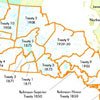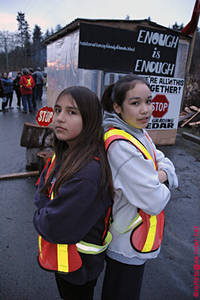Indigenous Rights and resistance Learn about Indigenous rights and efforts to assert them.
Indigenous Resistance
Here are some sources of information on some of those struggles, and the grassroots groups who support them.
Links
- Defenders of the land – a network of Fist Nations communities in land defence struggles.
- Grassy Narrows solidarity group, Friends of Grassy Narrows
- Supporters of the Lubicon First Nation, fighting oil resource extraction on their land, Lubicon Solidarity
- Haida First Nation
- Barriere Lake Solidarity
- Young Onkwehonwe United – Six Nations Youth activists
- Tyendinaga Support Committee
- Aw@l – solidarity group in Kitchener and Waterloo
- First Nations news site, Gathering Place
- Radical First Nations magazine, Redwire
- Immigrant rights and indigenous solidarity group, No One Is Illegal
United Nations
The Canadian governments’ refusal to recognize the rights of indigenous people is in violation of basic human rights as recognized by the United Nations.
The United Nations Declaration on the Rights of Indigenous Peoples asserts that “Indigenous peoples have the right to own, use, develop and control the lands, territories and resources that they possess by reason of traditional ownership or other traditional occupation or use, as well as those which they have otherwise acquired.” In other words, Indigenous people have the right to self-determination.
The United Nations Committee for the Elimination of Racial Discrimination also calls upon States to recognize and protect the rights of Indigenous peoples to own, develop, control and use their communal lands, territories and resources and, where they have been deprived of their lands and territories traditionally owned or otherwise inhabited or used without their free and informed consent, to take steps to return those lands and territories.
Supreme Court
 In recent years, the Supreme Court of Canada has frequently ruled that the governments of Canada must adequately consult with and accommodate the interests of First Nations communities. The exact definitions of "accommodate" and "consult" are being defined on a case-by-case basis. For more information on the legal details of the Supreme Court of Canada’s decisions: please download a legal briefing paper by Fraser, Miller, Casgrain, LLP.
In recent years, the Supreme Court of Canada has frequently ruled that the governments of Canada must adequately consult with and accommodate the interests of First Nations communities. The exact definitions of "accommodate" and "consult" are being defined on a case-by-case basis. For more information on the legal details of the Supreme Court of Canada’s decisions: please download a legal briefing paper by Fraser, Miller, Casgrain, LLP.
Recent Canadian Supreme Court Verdicts
- Haida (2005) The Haida's case for Aboriginal Title, which basically means the right to comanage the island of Haida Gwaii with the British Columbian Government, will be heard by the Supreme Court of Canada in 2006.
- Hupacasath (2005)
- Sparrow (1985)
- Taku (2004)
- Delgamuukw (1997)
- Mikisew Cree (2005)
These legal advancements reflect a cultural shift in public values towards Indigenous people, and the efforts of years and years of organizing and advocacy utilizing a spectrum of tactics by Indigenous communities and their allies. Still, the indigenous movement is a long way from achieving self-determination.





